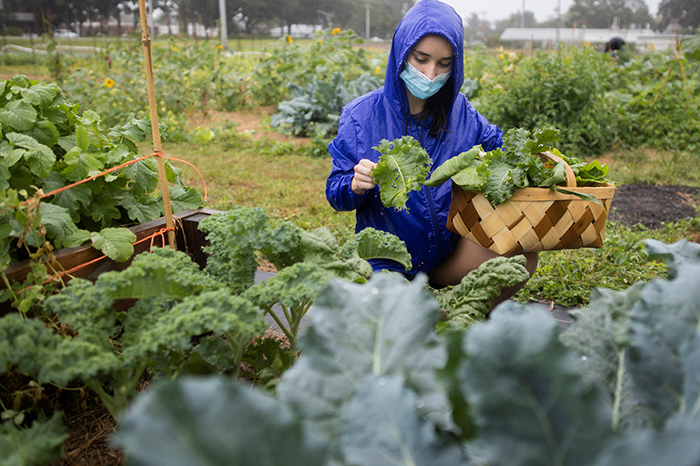- Marketing in the digital era and post-Covid-19 has presented growers with new challenges that can be turned into opportunities.
- A new program led by University of Florida researchers, faculty and Extension agents is bringing small-scale growers up to speed on marketing options that connect them with e-commerce opportunities and direct-to-consumer accessibility.
- The program is available in English and Spanish.

Small-scale grower operations have their advantages despite being challenged by access to large markets and limits on resources. In urban and rural environments, challenges that emerged from COVID-19 brought small-scale farms to light.
Having an edge in e-commerce post-Covid-19 has presented a new set of challenges for growers of all types and sizes. Specifically, for small-scale growers who consequently play a large role in local economies, the challenges can make or break their business and impact the local urban and rural communities they serve.
In the works is a new bilingual program designed by a team at the University of Florida Institute of Food and Agricultural Sciences (UF/IFAS). The team intends to arm small-scale growers with the tools to access marketing and business options.
“We aim to provide them with the tools and knowledge that will remove barriers to diversifying their marketing channels, help manage risk that can, in turn, increase their sales to higher-value markets, and provide consumers with better access to high-quality fruits and vegetables,” said Trent Blare, an assistant professor in food and resource economics at the UF/IFAS Tropical Research and Education Center.

Small-scale garden plot.
Blare is partnering with Lauri Baker, an associate professor in agricultural education and communication and a subject matter expert in digital marketing, to lead a team of faculty, scientists and UF/IFAS Extension agents implement the training.
The program, funded by a $50,000 grant awarded by the Southern Extension Risk Management Education Center, a subsidiary of the USDA National Institute of Food and Agriculture (NIFA), is one of four regional Extension Risk Management Education Centers located across the country.
“Our bilingual training and accompanying manuals will allow growers to create or update their marketing plans, while providing the skills to participate in these emerging markets, and provide personalized support in navigating this digital age reality,” Blare said.
The program’s curriculum consists of a series of workshops conducted in English and Spanish in Miami-Dade, Hillsborough, and Orange counties for a total of seven workshops. To reach a wider audience, the content of each session will be recorded and accessible on-demand for interested growers. Hands-on sessions will accompany the program along with access to personalized support from UF/IFAS Extension agents in the nearby areas.
The marketing reality that vegetable and fruit growers confront has changed dramatically over the last decade, said Blare. Previously, growers had primarily two marketing channels, packing houses or roadside stands. With changing consumer preferences for sustainably and locally grown foods, new avenues to advertise and make sales in the digital age, and the disruption to regional, national, and international food supply chains caused by the COVID-19 pandemic, growers are navigating unfamiliar grounds.
“Growers have mentioned to UF/IFAS faculty and Extension agents in Florida how disruptions in the supply chains caused by the COVID-19 pandemic have made them realize the importance of diversifying their marketing options to respond to similar shocks,” said Blare. “They are particularly interested in exploring options to direct market to consumers and using digital marketing with to reach their customers.”
As small operations with limited resources but often niche products, they promote jobs, provide a local link between the food people eat and the communities they serve, provide access to niche fruits and vegetables that thrive best under certain climate and environmental conditions.
“Our project for the grant targets small-scale growers especially those just beginning to set roots, as well as migrant farmers who need help developing a business plan and learning to market their products directly to consumers,” said Trent Blare, an assistant professor in food and resource economics at the UF/IFAS Tropical Research and Education Center.
An example of new growers emerging in the market comes from an agent at UF/IFAS Extension Hardee County citing quite a few Venezuelan migrants who have purchased land and are unfamiliar with marketing in the United States. In Miami-Dade County, there is a growing number of new growers from Venezuela and other Latin American countries. Another target audience for is the influx of Asian American communities moving here to grow Asian fruits and vegetables for markets in the northern United States, especially New York. Many of them very little farming experience. It would be useful to help them develop a business plan as well.
“Then there are growers who have been growing fruits, vegetables, and ornamental plants for years even decades,” added Blare. “The changing reality with e-commerce and consumers seeking out to buying directly has changed the marketing reality they have faced. The movement to these marketing channels has only been accelerated with the pandemic.”
This story originally appeared on UF/IFAS Blogs.
Check out stories about UF research on COVID-19.
